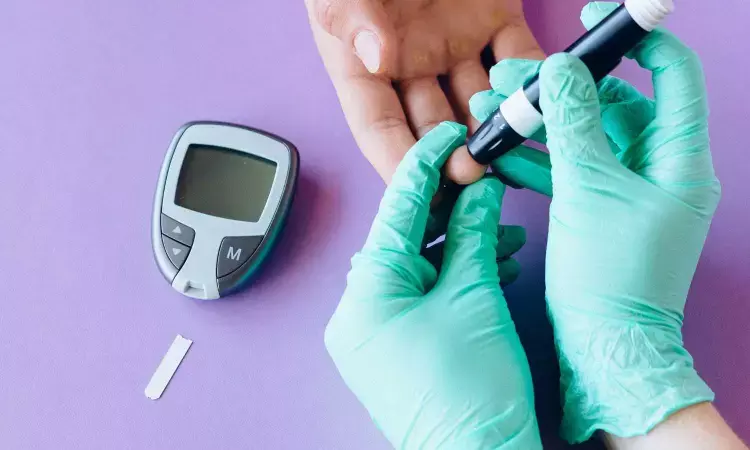- Home
- Medical news & Guidelines
- Anesthesiology
- Cardiology and CTVS
- Critical Care
- Dentistry
- Dermatology
- Diabetes and Endocrinology
- ENT
- Gastroenterology
- Medicine
- Nephrology
- Neurology
- Obstretics-Gynaecology
- Oncology
- Ophthalmology
- Orthopaedics
- Pediatrics-Neonatology
- Psychiatry
- Pulmonology
- Radiology
- Surgery
- Urology
- Laboratory Medicine
- Diet
- Nursing
- Paramedical
- Physiotherapy
- Health news
- Fact Check
- Bone Health Fact Check
- Brain Health Fact Check
- Cancer Related Fact Check
- Child Care Fact Check
- Dental and oral health fact check
- Diabetes and metabolic health fact check
- Diet and Nutrition Fact Check
- Eye and ENT Care Fact Check
- Fitness fact check
- Gut health fact check
- Heart health fact check
- Kidney health fact check
- Medical education fact check
- Men's health fact check
- Respiratory fact check
- Skin and hair care fact check
- Vaccine and Immunization fact check
- Women's health fact check
- AYUSH
- State News
- Andaman and Nicobar Islands
- Andhra Pradesh
- Arunachal Pradesh
- Assam
- Bihar
- Chandigarh
- Chattisgarh
- Dadra and Nagar Haveli
- Daman and Diu
- Delhi
- Goa
- Gujarat
- Haryana
- Himachal Pradesh
- Jammu & Kashmir
- Jharkhand
- Karnataka
- Kerala
- Ladakh
- Lakshadweep
- Madhya Pradesh
- Maharashtra
- Manipur
- Meghalaya
- Mizoram
- Nagaland
- Odisha
- Puducherry
- Punjab
- Rajasthan
- Sikkim
- Tamil Nadu
- Telangana
- Tripura
- Uttar Pradesh
- Uttrakhand
- West Bengal
- Medical Education
- Industry
How does metformin lower blood sugar?

Although metformin has been the go-to medication to manage type 2 diabetes for more than 60 years, researchers still do not have a complete picture of how it works. Scientists at Baylor College of Medicine and international collaborators have discovered a previously unrecognized new player mediating clinically relevant effects of metformin: the brain. By uncovering a brain pathway involved in metformin’s anti-diabetic action, researchers have discovered new possibilities for treating diabetes more effectively and precisely. The study appeared in Science Advances.
“It’s been widely accepted that metformin lowers blood glucose primarily by reducing glucose output in the liver. Other studies have found that it acts through the gut,” said corresponding author Dr. Makoto Fukuda, associate professor of pediatrics – nutrition at Baylor. “We looked into the brain as it is widely recognized as a key regulator of whole-body glucose metabolism. We investigated whether and how the brain contributes to the anti-diabetic effects of metformin.”
The team focused on a small protein called Rap1, found in a specific part of the brain known as the ventromedial hypothalamus (VMH). The researchers discovered that metformin’s ability to lower blood sugar at clinically relevant doses depends on turning off Rap1 in this brain region.
To test this, the Fukuda lab and his colleagues used genetically modified mice that lacked Rap1 in their VMH. These mice were fed a high-fat diet to mimic type 2 diabetes. When given low doses of metformin, the drug failed to lower their blood sugar. However, other diabetes medications like insulin and GLP-1 agonists still worked.
To further show that the brain is a key player, the researchers injected tiny amounts of metformin directly into the brains of diabetic mice. The result was a significant drop in blood sugar, even with doses thousands of times smaller than what’s typically given by mouth.
“We also investigated which cells in the VMH were involved in mediating metformin’s effects,” Fukuda said. “We found that SF1 neurons are activated when metformin is introduced into the brain, suggesting they’re directly involved in the drug’s action.”
Using brain slices, the scientists recorded the electrical activity of these neurons. Metformin made most of them more active, but only if Rap1 was present. In mice lacking Rap1 in these neurons, metformin had no effect, showing that Rap1 is essential for metformin to “switch on” these brain cells and lower blood sugar.
“This discovery changes how we think about metformin,” Fukuda said. “It’s not just working in the liver or the gut, it’s also acting in the brain. We found that while the liver and intestines need high concentrations of the drug to respond, the brain reacts to much lower levels.”
Although few anti-diabetic drugs act on the brain, this study shows that widely used metformin has been doing so all along. “These findings open the door to developing new diabetes treatments that directly target this pathway in the brain,” Fukuda said. “In addition, metformin is known for other health benefits, such as slowing brain aging. We plan to investigate whether this same brain Rap1 signaling is responsible for other well-documented effects of the drug on the brain.”
Reference:
Hsiao-Yun Lin et al. ,Low-dose metformin requires brain Rap1 for its antidiabetic action.Sci. Adv.11,eadu3700(2025).DOI:10.1126/sciadv.adu3700
Dr Kamal Kant Kohli-MBBS, DTCD- a chest specialist with more than 30 years of practice and a flair for writing clinical articles, Dr Kamal Kant Kohli joined Medical Dialogues as a Chief Editor of Medical News. Besides writing articles, as an editor, he proofreads and verifies all the medical content published on Medical Dialogues including those coming from journals, studies,medical conferences,guidelines etc. Email: drkohli@medicaldialogues.in. Contact no. 011-43720751


